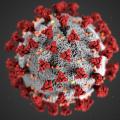Pets and Coronavirus
Can my pet contract coronavirus?
While both dogs and cats are susceptible to some strains of coronavirus, at this time we do not have evidence that our dogs can contract or spread the COVID-19 strain. There have been, however, isolated reports of cats contracting the virus from humans, but none to suggest they can spread it back to humans.
There may be some confusion about this, as our pets can contract other strains of coronavirus. Some of these have been known to be passed between humans and animals.
Vaccines for intestinal coronavirus strains in dogs and cats do exist, but no veterinary vaccines are available for protection against COVID-19 or other respiratory strains of coronavirus found in pets.
How can I protect my pet from COVID-19?
If you are not ill, you may continue to interact with your pet as you normally would, but should continue to practice good personal hygiene, including washing your hands before and after interacting with your pet.
To help protect your furry family, there are a few additional steps you can take:
- continue to include your pets in your emergency preparedness planning, including a two-week supply of food and medications
- make sure you have a pet first aid kit available
- wash hands often and try to avoid contact with those who are sick
- isolate pets from other animals if they have been exposed to a sick animal
- isolate pets from other pets in the household if they have symptoms such as coughing, sneezing, vomiting, diarrhea or lethargy
- always follow your veterinarian's recommendations for preventive care (things like heartworm and flea/tick control, vaccinations, nutrition, and disease management)
- contact whiskerDocs via phone, chat, or email, 24/7, if you're unsure whether your pet needs medical treatment
What if I'm COVID-19 positive?
If you or someone in your household has been diagnosed with COVID-19, for extra safety, wear a mask and use gloves around your pet. To be extra cautious, you could also ask someone else to help with day to day care such as feeding, changing water bowls, walking dogs or cleaning litterboxes for cats.
To be clear, these steps are just a precaution. We have no evidence at this time that indicates our dogs can become infected with or spread this strain of coronavirus, even if someone in your home has been diagnosed. Cats and ferrets, however, may be able to be infected by sick humans.
Can cats contract COVID-19?
Recent reports have suggested that cats and ferrets are at risk for contracting the coronavirus. There have been confirmed cases of domestic cats in Belgium and several lions and tigers from a zoo in the United States testing positive. Scientists in other countries have also studied the possibility of infection and transmission, although the results of these studies have not yet been peer-reviewed.
What we understand to be true at this time is that cats can contract the novel coronavirus from humans, but cannot spread coronavirus back to humans. Additionally, we believe that cats sickened with COVID-19 can pass the virus on to other cats.
Cat owners should take care to separate sick cats from other cats in their household. If the someone in the household is positive or suspected positive for COVID-19, that individual should isolate themselves from the cat if at all possible, or follow standard guidelines for protective gear to reduce the chance of transmitting COVID-19 to their feline friends.
I've heard that dogs have tested positive, too
While there have been reports of two dogs in Hong Kong, these cases have not been peer reviewed or confirmed. Additionally, multiple health organizations, infectious disease experts, and scientists have concluded that there is no evidence that our companion animals can transmit the virus to other animals or people.
More detailed information about these cases is available on the AVMA website.
Does my dog need to practice social distancing?
While walking your canine friends, it is wise to have them practice social distancing as well. It's best to avoid having strangers pet your dog. If someone does pet your dog, give him/her a quick wash with warm water (with or without a couple drops of Dawn dish soap in it) or dog cleansing wipes when you return home. This is out of an abundance of caution. While there is no evidence to suggest that the virus can live on a dog's fur, nor that your dog will contract it, these measures ensure safety for your human and feline family members.


